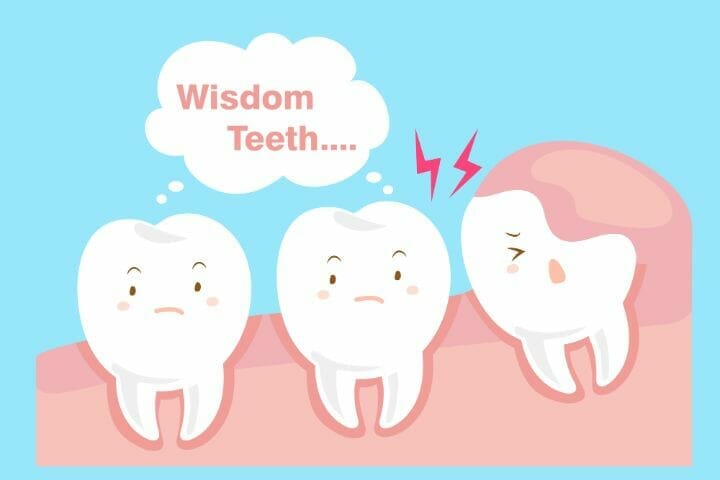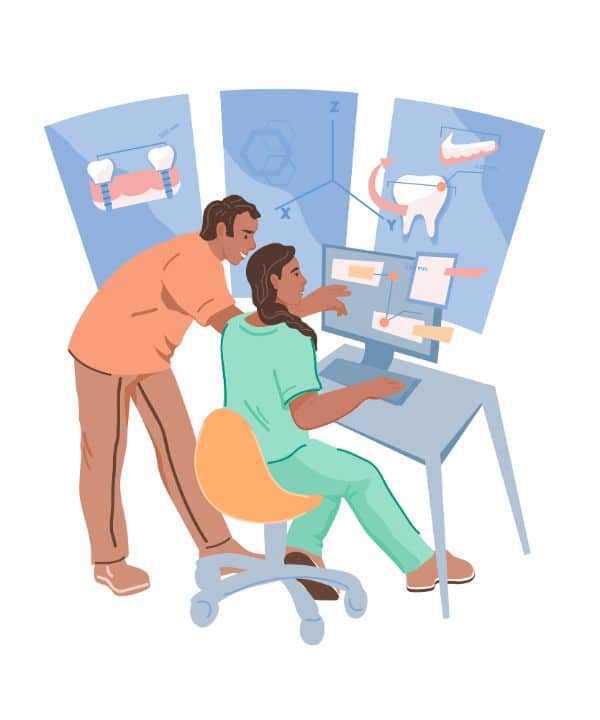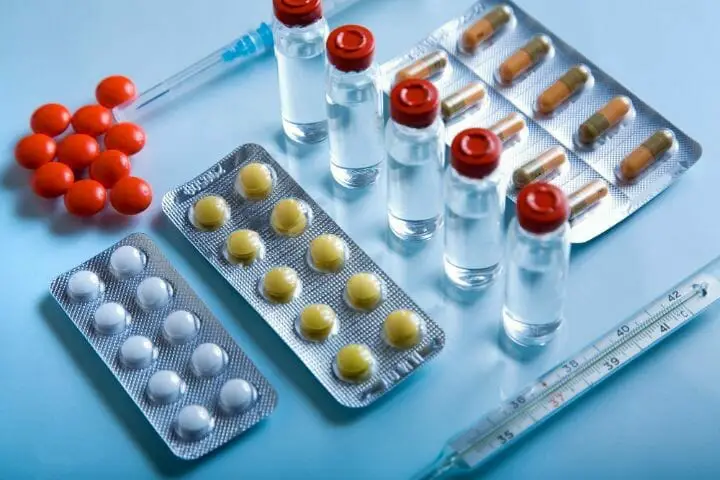A Little History of Wisdom Tooth
During evolution, humans used to have larger and stronger jaws. Along with these, wisdom teeth used to help them in chewing raw meat and plants.
Even today, an average person has four wisdom teeth, although it is possible to have more than four wisdom teeth. However, today, when we are fully evolved physically, our jaws are smaller, and we can access better dental healthcare.
So, as a side effect, our wisdom teeth may not have enough opportunities to erupt into a functional position. As per the AAOMS (American Association of Oral and Maxillofacial Surgeons), nearly 9 out of 10 people may not have enough space in their mouth for a wisdom tooth to erupt through the gums.
According to the APHA (American Public Health Association), approximately five million people in the USA have their wisdom teeth extracted every year. Dentists may recommend their patients undergo the wisdom teeth removal procedure for many reasons such as cavities, infection, tooth crowding, or gum disease.
Most of the time, the wisdom teeth extraction, a minor surgery, is done by an oral surgeon. Although, in general, tooth extractions are routine to alleviate tooth pain, patients may still experience swelling, pain, and discomfort.
The good news is that understating all the options and being prepared for the post-procedure do’s and don’ts can help you mitigate the pain and discomfort during the procedure and even after that.
In this article, we have collated all things you can do to make your wisdom tooth removal a better experience.
You may also like Best Electric Toothbrushes for the Elderly
The Right Age to Get Your Wisdom Teeth Removed?
Typically, wisdom teeth roots are formed during the teenage years. Until the roots are two-thirds developed, your wisdom teeth are easiest to remove without any complications. It is essential for teenagers with wisdom teeth and their parents to consult with a professional to ensure they do not lose that window.
If the wisdom teeth are not removed in the teenage years, the roots continue to strengthen with age. Like all other teeth, wisdom teeth also reposition and make it difficult for an oral surgeon to extract them without elevated risks such as injuring a nerve. Furthermore, once an individual crosses the 30s, removal becomes riskier, and the recovery even longer.
Plan for the Extraction
So, now, if you plan to get your wisdom tooth or teeth removed, it is a good idea to get yourself ready for the procedure. As a first step, you may want to talk to the dentist or oral surgeon and alleviate your concerns or doubts.
It will help you get a better idea of what you can expect during and after your wisdom teeth removal procedure.
The second step is to schedule your surgery around the time when you can take a few days off work or school for recovery after the extraction procedure.
Many people plan their surgery on Wednesday or Thursday, which gives them a weekend to recover and get to their routine from next week.
You may also need to arrange for someone to help you get home after the surgery, and if possible, to spend the remainder of the day with you after your procedure.
Most dental professionals and oral surgeons will provide their patients with a list of things they should do before and after completing the extraction procedure. As a patient, you must read over the list and clarify any doubt you may have with the dental office.
Before the appointment, you’ll receive a dose of antibiotics. They will ask you not to have eaten or drink anything at least six hours before the procedure.
Later, during the procedure, the dentist will give you local anesthesia to numb the area she will operate on. It will ensure that you do not feel any pain when she is extracting the tooth.
After the procedure, you may feel less alert and even sleepy. It is because the effect of anesthesia will remain for a few hours after the procedure. So, you should have somebody to drive you home.
You might also like: Best Electric Plaque Remover
Be Prepared For Post-Procedure Effects
After your tooth is extracted, the swelling around the operated area gets worse before it gets better. Lasting up to a week, the swelling may peak 48 to 72 hours after the procedure.
You should apply an ice pack and keep your head elevated to make the swelling go down faster. Although it does not happen to everybody, you may also observe some bruising or yellowness appear around the operated area a few days later. So don’t worry about that unless your pain aggravates.
Also, you might experience intermittent bleeding from your mouth for the first few days. To take care of that, your dentist may give you a gauze to bite for 15 to 30 minutes, which will make the bleeding stop.
To stop bleeding, you may also try biting a wet tea bag. The tea has natural ingredients that will control the bleeding, probably even better than the gauze pad.
Pain Relievers
Every intrusive medical procedure comes with some residual pain after it is done. The level of pain and discomfort after a wisdom tooth extraction may vary from individual to individual.
To alleviate severe pain, your surgeon may prescribe you narcotic drugs such as Vicodin, Hydrocodone, Oxycodone, or Percoset to relieve pain.
If you don’t want to take narcotics, you can combine Advil and Tylenol. In combination, these drugs make an extremely effective method to get relief. However, you must limit it to 3000 mg of Tylenol and 2400 mg of ibuprofen in a period of 24 hours.
You should also ensure that you have someone around you to help you follow the schedule recommended by your dentist. Under the effects of anesthesia, it may be hard to remember these small things.
You might also like Best Endodontic Motor
Post-procedure Care
Your dentist or the oral surgeon will give you a set of instructions to heal faster from your wisdom tooth removal.
Post-procedure, because of this stiffness, you may not feel like opening your mouth at all. However, if you don’t do that, stiffness can become permanent. So, it would help if you work through the stiffness by opening and closing your mouth. You can start slowly and do it persistently.
Besides the mouth exercise, your surgeon may give you a special liquid to rinse your mouth, or she may advise you to use salt water. You will have to rinse with either of these several times a day, especially after eating or drinking. Rinsing with one of these solutions will help reduce swelling and pain and expedite the healing process.
To reduce your post-procedure bleeding, your dentist or oral surgeon will instruct you to bite down gently on a piece of gauze. After 12 hours, you may switch to a wet tea bag. As mentioned earlier, tea leaves can help reduce pain and encourage clotting.
Also, post-surgery, you may face issues in swallowing liquids, and as the mouth is numb you may drool. So, keeping tissues around you after oral surgery will also help.
You may also like Can You Soak Dentures In Mouthwash?
What Would You Eat?
After the procedure, you should be careful with what you eat and drink. Most dental experts recommend that people start with liquid food.
If you live alone, before you go for the extraction, it is good to stock your kitchen. It would also help if you also talk to your oral surgeon about what foods and drinks will be right for you after your wisdom teeth are removed.
Do not forget to mention your allergies so that the dentist may recommend an alternative.
For all the ice cream fans, it is good news. You can eat as much ice cream as you want. Your dentist may also recommend a liquid diet of yogurt, pudding, smoothies for the first 24 hours. So, you can stock up on all these things. The only thing you should remember is that you avoid drinking from a straw because the suction caused by a straw can loosen blood clots.
After 24 hours, for the next 4-5 days, you may have soft foods such as mashed potatoes, scrambled eggs, and pasta. After a few days, it may be possible for you to move on to solid foods.
You should also minimize having chewing gums and give the muscles some rest. You may also want to avoid eating very spicy or hot foods and consume colder foods to feel soothing.
Also, smoking and alcohol after the extraction procedure can be very injurious to health, especially if you’re taking medication.
You might also like Can I Use Mouthwash With Dentures?
Take Rest, Relax, and Entertain Yourself
It may be normal nowadays, but the wisdom teeth removal procedure is surgery, and your body will need adequate rest to heal. All of us may want to return to our everyday life as quickly as possible, but it may still take some time.
For long-term recovery, you need to take things slowly. You should avoid exercising for at least 24 to 36 hours post-procedure.
It is better to spend a few days resting and relaxing. You may put your head on an elevated set of pillows and relax as much as you can.
It is the time when you can’t do many things comfortably. Even reading a book may not be very comfortable. However, you can do one thing, and that is watching your favorite show on your favorite streaming service. So, go ahead and enjoy it.
Returning to Work or School
It may be best to schedule the procedure on a Thursday or Friday so that you get a weekend to get back to work or school the following week. However, on the following Monday, if you still require strong pain medication to be comfortable, you may not be ready to go back to work or school.
So you should judge your condition and decide when you can start work. You can still do the job remotely if it is possible. You should also not drive or operate machinery, particularly when taking narcotics.
You may also like Can I Use Toothpaste On Dentures?
Conclusion
While all the above steps are easy to follow, there is always a possibility that you face unexpected things or an emergency. Any complication can set back your healing process.
So, to manage that risk, you must keep the phone number of your dental office handy. Although more of a precaution, it is helpful in case you aren’t healing as predicted. If anything concerns you, call and check whether your condition requires you to see them.





